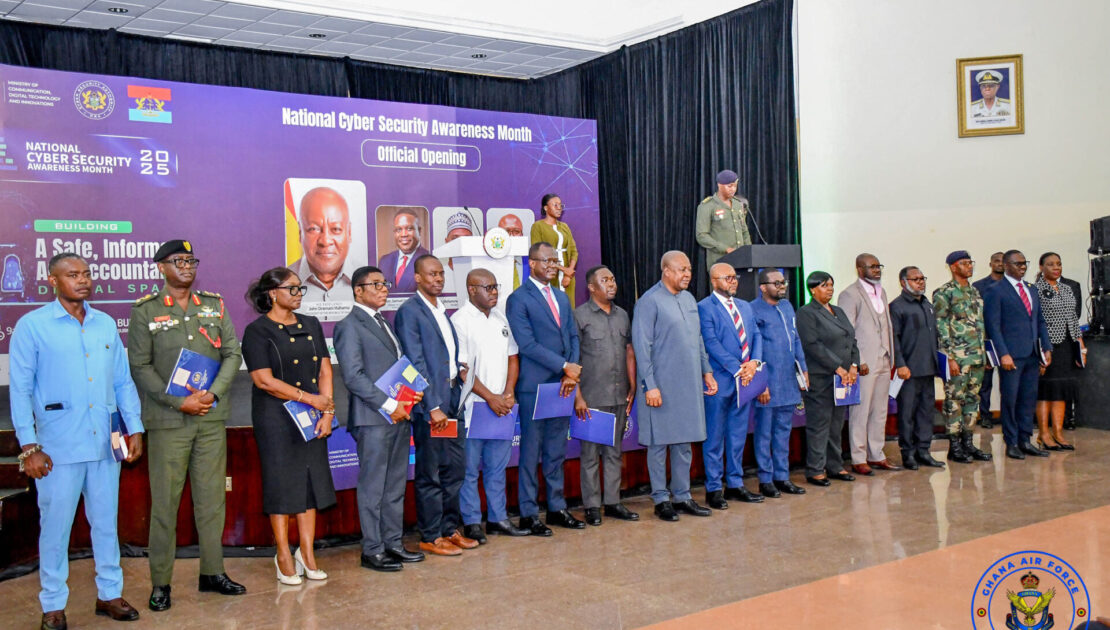[mc4wp_form id=”2320″]
Ghana Launches National Cyber Security Awareness Month 2025
-
October 9, 2025
- Posted by: Evans Asare

Ghana launches National Cyber Security Awareness Month 2025: Everything you need to know.
As Ghana deepens its digital transformation, cyber threats threaten to undo progress. To address rising attacks, misinformation, and public vulnerability, the government inaugurated National Cyber Security Awareness Month (NCSAM) 2025. The launch sets a tone of urgency, shared responsibility, and coordinated action to protect Ghana’s people, institutions, and critical infrastructure.
The Launch Event: Key Moments & Leaders
Presidential Launch at Burma Hall, Accra
On 1 October 2025, President John Dramani Mahama officially launched NCSAM 2025 at Burma Hall in Accra, under the banner “Building a Safe, Informed and Accountable Digital Space.” GhanaWeb+4Ghana Ministry of Interior+4af.mil.gh+4
He emphasized that while digitalization brings immense benefits, it also introduces serious vulnerabilities. He warned that cyber threats know no borders, insisting Ghana must prepare collaboratively and proactively. TechAfrica News+3Ghana Ministry of Interior+3The Presidency, Republic of Ghana+3
Inauguration of Joint Cyber Security Committee
As part of the launch, the president inaugurated an 18-member Joint Cyber Security Committee (JCC). This committee brings together security agencies, intelligence units, public institutions, and stakeholders to coordinate Ghana’s response to cyber threats. af.mil.gh+3The Presidency, Republic of Ghana+3Xinhua News+3
Mahama noted the JCC would ensure “coherence, coordination, and proactive measures” within national defense and cybersecurity architecture. The Presidency, Republic of Ghana+2Xinhua News+2
Leadership Voices & Calls to Action
- Samuel Nartey George, Minister for Communication, Digital Technology and Innovations, praised the theme and called on citizens to be cautious online, verify information, and participate in awareness efforts. Ghana Ministry of Interior+2CSA+2
- Hon. Muntaka Mohammed-Mubarak (Interior Ministry) stressed that cybersecurity is a shared responsibility and urged institutions and individuals to safeguard personal data and report suspicious behavior. Ghana Ministry of Interior+2GBC Ghana Online+2
- During the media launch earlier, the Director-General of the Cyber Security Authority (CSA), Divine Selase Agbeti, warned that daily cyber scams exploit impersonation, fraudulent online shopping, and recruitment scams. CSA
- Leaders from law enforcement, academia, and media also urged collaboration across sectors. CSA+1
Additionally, Ghanaian government sources revealed that with about 24.3 million internet users (≈ 70 % penetration) and nearly 8 million active social media accounts, digital exposure is high—and risks multiply accordingly. af.mil.gh+1
Goals, Themes & Priority Areas
Overarching Theme & Focus
NCSAM 2025 carries the theme “Building a Safe, Informed, and Accountable Digital Space.” Ghana Ministry of Interior+4ncsam.csa.gov.gh+4The Presidency, Republic of Ghana+4
The program highlights the intersection of cybersecurity, misinformation, and digital rights, especially in the face of emerging technologies like AI. ncsam.csa.gov.gh+2The Presidency, Republic of Ghana+2
Planned goals include:
- Raising public awareness about cyber risks
- Promoting media literacy and fact-checking
- Protecting digital rights within Ghana’s digital transformation agenda
- Strengthening institutional capabilities in cybersecurity
- Educating children, businesses, government agencies, and civil society on safer online practices CSA+3ncsam.csa.gov.gh+3Ghana Ministry of Interior+3
Program & Events Lineup
The CSA website shows that NCSAM 2025 will roll out a wide range of activities:
- Workshops on protecting critical infrastructure
- National cyber drills and tabletop exercises
- Consultations on child online protection, especially for persons with disabilities
- Training for judges, prosecutors, law enforcement on cybercrime and digital evidence
- Sessions on AI, cloud security, and cybersecurity standards
- Public campaigns, stakeholder engagements, and media outreach ncsam.csa.gov.gh
These events aim to engage diverse actors—from schools and NGOs to financial institutions and tech firms. ncsam.csa.gov.gh
Legal & International Commitments
President Mahama announced plans for Ghana to ratify and sign the United Nations Convention on Cybercrime during the month, giving the country stronger tools to prosecute cybercriminals and protect critical infrastructure. TechAfrica News+3The Presidency, Republic of Ghana+3Xinhua News+3
Ghana remains a signatory to the Malabo and Budapest Conventions on cybercrime, and now seeks to deepen its international engagement. TechAfrica News+3The Presidency, Republic of Ghana+3Xinhua News+3
Also, the government has proposed creating a Cyber Security Fund under the Cyber Act 2020. This fund will support national cyber initiatives, protect critical infrastructure, and build capacity across sectors. TechAfrica News+1
Why It Matters: Risks & Opportunity
Escalating Cyber Risks
Ghana, like many nations, sees rising financial and reputational losses from cybercrime. ncsam.csa.gov.gh+2CSA+2
Human error plays a massive role—studies cited during the launch claim 95 % of breaches stem from human mistakes, such as clicking malicious links or sharing credentials. TechAfrica News
Online scams, recruitment fraud, impersonation, sextortion, and misinformation all degrade trust in digital systems and threaten vulnerable users. CSA+2Ghana Ministry of Interior+2
A Chance to Strengthen Resilience
If Ghana leverages this momentum well, the campaign can:
- Improve cyber literacy across society
- Build cross-sector coordination to respond to threats
- Strengthen legal frameworks and enforcement
- Support startup ecosystems, fintech, critical infrastructure
- Position Ghana as a cybersecurity leader in West Africa
Challenges to Watch
While ambitions are high, several hurdles remain:
- Implementation vs. announcement: Many programs are declared; success depends on follow-through and resources.
- Sustainability: The Cyber Security Fund, training programs, and institution strengthening need long-term financing, not one-off budgets.
- Skills and capacity: Ghana must grow and retain cybersecurity professionals despite global competition.
- Coordination across agencies: The JCC must break silos and ensure effective joint operations.
- Public engagement: Awareness must go beyond urban centers; rural areas often lag behind in access and knowledge.
Conclusion: A Pivotal Step Toward A Safer Digital Ghana
Ghana’s launch of National Cyber Security Awareness Month 2025 marks a bold moment in the country’s digital journey. With a clear theme, institutional backing, and ambitious programs, the government signals that cybersecurity is no longer optional—it’s essential.
If the rhetoric turns into real action—funded programs, partnerships, legal enforcement, and grassroots education—then Ghana can reduce cyber risks, protect vulnerable users, and build trust in its emerging digital economy.
Still, success won’t come automatically. It requires consistent effort, collaboration across sectors, and vigilance from all citizens. If everyone plays their part, this awareness month could spark enduring change rather than a fleeting campaign.
